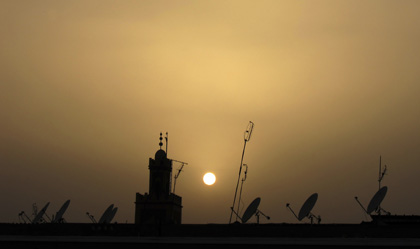While high-ranking Arab officials are not held accountable for misinforming or misleading the public, critical journalists in their respective countries are increasingly dragged into courts and handed harsh jail sentences following unfair trials for “spreading false news.”
The author of one of the most recent pieces of official misinformation is Moroccan Minister of Communication Khalid Naciri. In a statement to the independent daily Akhbar al-Youm al-Maghrebia, earlier this month he claimed that the draconian restrictions recently imposed on Arab and foreign TV reporting in the Kingdom of Morocco “are also implemented in all democratic countries.”
He added that Morocco, which he called a “democratic country,” was eager to put its “media field in order and bring it into conformity” with the media standards and regulations in other democratic nations. Naciri later reiterated the same statement—just as the Moroccan government’s attacks on independent journalism were on the rise.
All TV networks, “whether Arab or foreign, are now required to obtain authorization from the Ministry of Communication if they want to do TV reporting or any televised press assignment outside the capital, Rabat,” Naciri declared.
Arab TV journalists based in Western capitals or traveling on assignment in different parts of the world told CPJ that they are not required to apply for authorization in addition to their accreditation to cover events outside London, Paris, or Washington—or even Harare, the capital of Zimbabwe, one journalist said.
“Regulating and supervising TV reporting by the authorities is an ordinary measure taken in all advanced countries and Morocco is eager to head in this direction,” Naciri said. But Moroccan journalists and human rights lawyers told CPJ that their country is still far from being a democracy. They explained that this new restriction on press freedom has been adopted to mainly target Al-Jazeera satellite TV, whose coverage of social unrest in Morocco and critical guest speakers often anger the authorities and prompt reprisal.
In March, CPJ wrote to King Mohammed VI to express disappointment over the “government’s continued use of the courts to suppress freedom of expression” and to ask him to instruct authorities to end “the practice of withholding accreditation from journalists,” including two working for Al-Jazeera.
Naciri took precaution to mention that the Saudi satellite Al-Arabiya TV and the U.S.-government-backed Al-Hurra TV are also required to abide by what he euphemistically called this “ordinary measure.” But neither of these networks has given the Moroccan authorities as much of a headache as Al-Jazeera. The Qatari-backed, most influential Arabic media outlet is currently facing the same drastic restriction on its ability to cover events outside the Egyptian and Iranian capitals, journalists told CPJ.
“This is a senseless decision aimed at intensifying the siege on freedom of expression,” said Taoufik Bouachrine, editor of Akhbar al-Youm al-Maghrebia and one of the most harassed journalists in Morocco. “They seem afraid of seeing the social protests which occur far from Rabat, the rather quiet and administrative capital, covered particularly by Al-Jazeera.”
Many Arab journalists told CPJ that they regret that Morocco—which spurred more hope than any other Arab country among human rights and democracy advocates on the eve of King Mohammed VI’s ascension to power in 1999—seems to be increasingly inclined to turn its back on international standards for freedom of expression and to abide by the notorious 2008 Arab League’s Principles for Organizing Satellite and TV Broadcasting.
